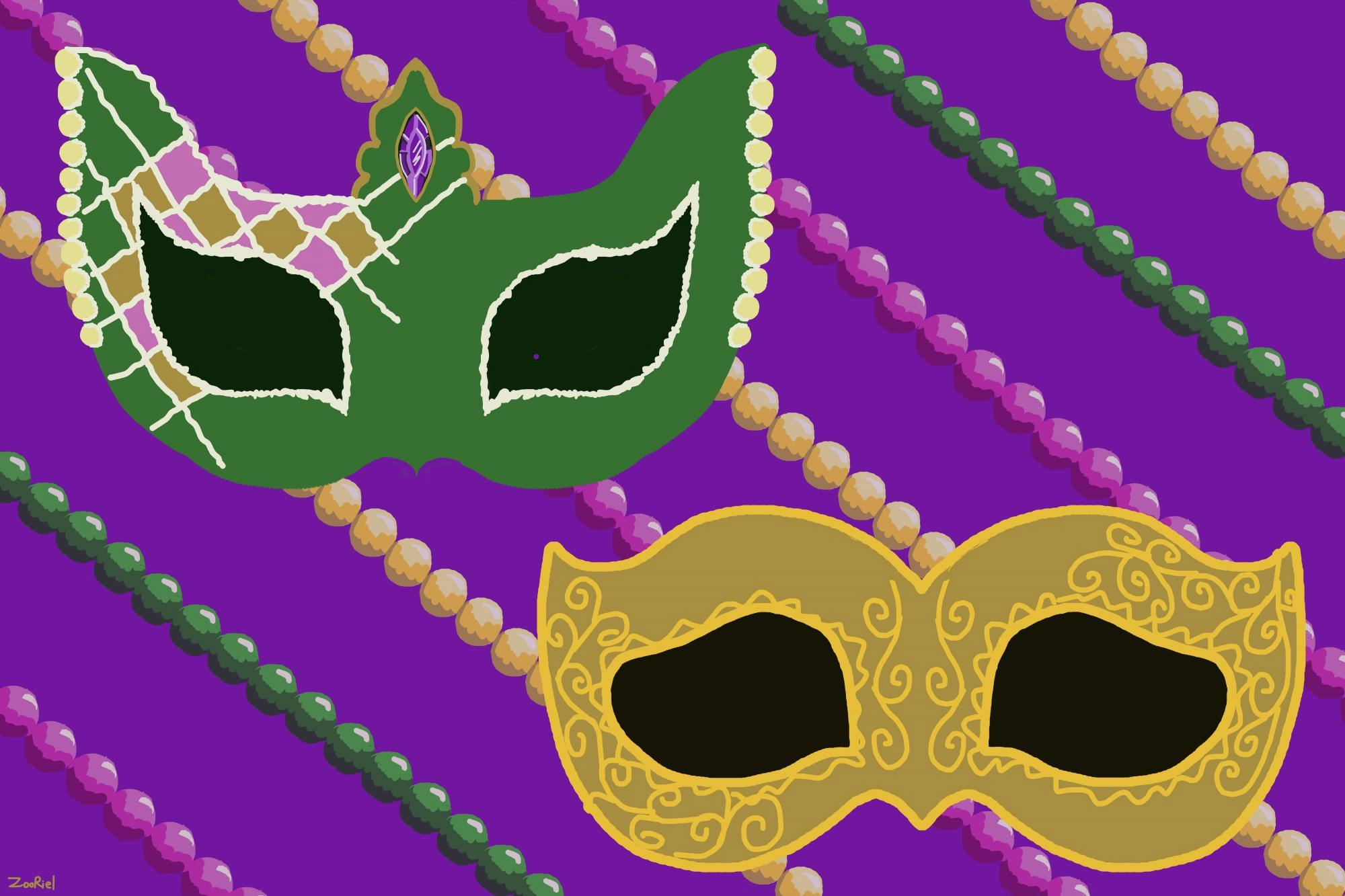Ah, Mardi Gras. You know, that crazy event that you saw on all of your friends’ Snapchat stories and Instagram posts last week? The one with the green, yellow and purple beads that fly around like heat-seeking boomerangs? Where outrageous floats loom over onlookers and jazz vibrates through the air like a symphony of pure jubilation? It’s amazing to witness the spectacle that Mardi Gras has become — even to simply view its raucous energy over social media and other outlets leaves you questioning what it truly means to “celebrate.”
Mardi Gras first appeared in medieval Europe as a pagan spring and fertility festival thousands of years ago, far from the celebration you see today. But it wasn’t long before the holiday spread to Rome. There, under Catholicism, it gained a new identity as the prelude to Lent — the 40 day period of fasting and repentance before Easter. Then, France left its mark, bestowing the name Mardi, meaning ‘Tuesday’, and Gras, meaning ‘fat’, onto the festival. Finally, it made its way to the United States through French colonists, where it has gained national and global prominence through the city of New Orleans. It’s taken different forms in other cities around the globe — such as Carnival in Rio de Janeiro — but in New Orleans, a city so vastly different than any other in the United States, Mardi Gras has flourished.
This year, after Mardi Gras’ brief COVID-19 hiatus last winter, several students had the opportunity to celebrate the holiday in New Orleans first hand, bringing back memories of an experience that seems so out of the purview of anything we do here at Dartmouth. One of them, Miles Rubens ’22, was invited down to New Orleans along with seven other Dartmouth students through the parents of a friend.
“Everything was very crazy,” he said with a laugh. “The entire city basically shuts down. We went to a massive parade with 40 different huge floats and there were big, fancy parties, nice warm weather, and we got to experience lots of Spanish and French culture and history. And somehow, I always saw marching bands and heard jazz music playing. It was all totally different and really cool.”
That sense of “difference” is a major attraction for any student wishing to go to Mardi Gras — or anyone who leaves campus, even for a brief while. We spend so much time here in Hanover, in the Dartmouth bubble, that we can sometimes lose perspective. Sure, Dartmouth can be a wonderful, sleek little bubble, but it can also be suffocating. For Jack Shire ’23, who was invited down to New Orleans by his cousin, the ability to escape was liberating.
“A lot of the things I stress about on a week to week basis here, in the grand scheme of things and in five, ten, probably even two years, they're not going to matter,” he said. “It just helps to put that in perspective, to reset and refresh. Because as fun as it is here, it does get a little draining.”
Rubens agreed, saying, “At this point in the term, I’m always kind of sick of my classes, and the weather is not so great, so to be able to leave and to be able to hang out with Dartmouth people in a place outside of Dartmouth was awesome. I felt very fortunate that I had the means and ability to do that.”
Unfortunately, for some students, especially those from New Orleans, missing out on Mardi Gras generated a lot of FOMO (“fear of missing out”). For Ben Wilkins ’24, who has lived in New Orleans since he was ten years old, Mardi Gras has been a major part of his life every year, and this was the first year in a while that he was not able to attend.
“It was a little sad not being there with my family and friends,” Wilkins said. “My parents FaceTimed me from the parade routes, and all of my friends’ Snapchats were filled with videos of the parades and parties. But that being said, not being at Mardi Gras this year will only make the next one more special.”
At its core, Mardi Gras is a holiday celebrating indulgence before a time of great structure and sacrifice. In many ways, it shares similarities with aspects of the Dartmouth culture, particularly the mindset of “work hard, play hard” to which many of us subscribe. Of course, “playing hard” can take on many different forms, not solely the experience of partying, but still, that sense of indulgence is prevalent here at Dartmouth.
“I often say that Dartmouth has a ‘work hard, play hard’ atmosphere and New Orleans is just a ‘play hard’ atmosphere,” Wilkins said.
Shire echoed this statement, saying, “I think indulgence in certain quantities like Mardi Gras is a good thing. A lot of our lives are filled with stress, so having that opportunity to indulge helps limit your own indulgence in times where you’re not supposed to indulge.”
Shire connected this pattern of work and play back to the Dartmouth experience, observing that students party and “escape” reality on the weekends, but put their heads down and get back to work when Monday rolls around.
Obviously, as an academic institution first and foremost, Dartmouth is full of students who do not share that mentality. But as we approach finals and the end of this term, it’s fascinating to reflect on a celebration in a city that appears to be on an entirely different planet than Hanover, New Hampshire. And yet, that balance, between indulgence and structure, is one that I know I am constantly tinkering with, one which I will be tinkering with throughout the rest of my days here at Dartmouth.




